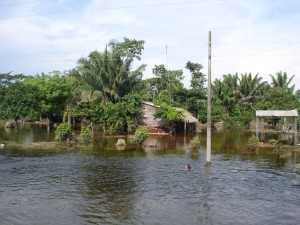March 4, 2010
DARA continues to make progress in the development of the Risk Reduction Index (RRI) which will provide a means for measuring disaster risk reduction capacities and conditions in different countries. In the short term, this index methodology will be applied in pilot fashion in 7 Central American and Caribbean countries and will hope to highlight those conditions that contribute to such disasters as that recently suffered in Haiti.
With this index, DARA attempts to collaborate in the strengthening of national, sub-national and local capacities in one of the most disaster-prone areas of the world.
DARA’s intention is to inform and hopefully influence donor and affected countries’ policies with the intention of reducing the vulnerability of at risk populations. “The [RRI] effort goes beyond putting a number on existing capabilities and conditions by reaching out to educational and advocacy principles,” said P.H.D. Allan Lavell, who heads the project, at the Connecting for Sustainable Change, Building Disaster Resilience through Global Networking, Conference held in London January 25-27.
The index is based on a well developed conceptual framework and tried methodology, combining analysis at different spatial scales and uses both internationally published, national level quantitative and qualitative data based on different stakeholder’s perceptions and knowledge.
DARA’s project is an effort to complement other global efforts to understand or measure the implementation of risk management principles. The index will concentrate on the underlying risk factors component of the Hyogo Framework for Action and, “will downscale the level of analysis from the national level and upscale from the local level, examining processes at a sub-national level of resolution” added Lavell.
For this purpose, the DARA team has coined the term Representative Territorial Unit (RTU) which is where risk and its management are expressed territorially in different modalities. The RTUs are representative of disaster risk in the nation as a whole and, therefore, the information collected within the RTUs will help establish national risk management tendencies.
After completing a diagnostic profile phase in selected Central American and Caribbean countries and a pilot run of the sub-national questionnaire based methodology in Costa Rica, DARA is now initiating the fully fledged RRI Country Phase, where the questionnaire methodology will be applied in seven countries and sub-national indexes calculated. The results of this effort will be discussed and debated in a national workshop organized with the presence of RTU key informants and other national level actors.
The Spanish Agency for International Development Cooperation (AECID in its Spanish acronym) is financing the development of the project in Central America and the Caribbean. DARA is hoping to expand the experience to other countries in West Africa and South East Asia, where potential partners are now being identified.
The RRI is part of a broader DARA programme known as the disaster risk reduction initiative.

Share this